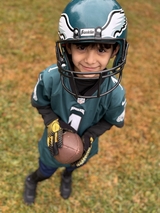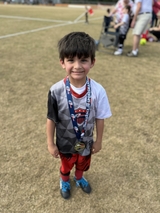Jayant's Fetal Surgery for Myelomeningocele Story
Jayant's Fetal Surgery for Myelomeningocele Story
When Emily and Sunil left their home in Florida to entrust the care of their unborn child to the team at Children’s Hospital of Philadelphia’s (CHOP’s) Center for Fetal Diagnosis and Treatment (CFDT), they couldn’t have hoped for a better outcome. Now in first grade, Jayant is thriving and active.

Emily is a nurse practitioner, so she is familiar with conditions like spina bifida. But learning during pregnancy that her own baby had the condition really threw her for a loop.
At the routine ultrasound 18 weeks into her pregnancy, Emily’s maternal-fetal medicine (MFM) doctor in Tallahassee, FL, told her something didn’t look right in her son’s brain and that there was an opening in the spine consistent with myelomeningocele (MMC), the most severe form of spina bifida.
The MFM printed information about the condition from CHOP’s website and told Emily about the Management of Myelomeningocele Study (MOMS), which was co-led by experts at CHOP’s Center for Fetal Diagnosis and Treatment. The study showed that fetal surgery for MMC greatly reduces the need to divert fluid from the brain, enhances mobility, and improves the chances that a child will be able to walk independently.
When Emily got home, she searched the web for everything she could find about MMC and found Twice Born, a PBS documentary series that aired in 2015 about the CFDT and its unique Garbose Family Special Delivery Unit (SDU). One of the families featured in the series underwent fetal surgery for MMC. After watching the series that night, Emily and her husband, Sunil, decided CHOP was where they needed to go.
“We said we want to go to the best; we want to go where they have experience,” says Emily.
It was during their stay at CHOP that Jayant's family became lifelong Philadelphia Eagles fans. The team recently featured Jayant as one of their Gameday MVPs! Check out his video feature and spotlight article.
Fetal surgery for myelomeningocele
Emily’s insurance initially refused to cover care at the CFDT, as they deemed fetal surgery “experimental.” The family appealed the decision, submitting a letter of support from their MFM, research articles, and information about CHOP’s participation in the MOMS trial.
Fetal surgery for MMC must be performed by the 25th week of pregnancy, so Emily and Sunil couldn’t wait for approval. They made an appointment to be evaluated at the CFDT, booked their flight, and were prepared to pay out of pocket for care if they had to. Fortunately, just five days before their appointment, they received approval from their insurance company.
Emily and Sunil journeyed 1,000 miles to Philadelphia to see if they were candidates for fetal surgery. As stressful as that time was and as much anxiety as the couple had, watching Twice Born helped prepare them for how things were going to go on the day of the evaluation. After two days undergoing tests and counseling with the CFDT team, they learned they were candidates for fetal surgery.
Why travel to CHOP?
Families that undergo fetal surgery often must relocate to the Philadelphia area for the duration of their pregnancy and delivery. The couple returned home, sold their house, put their belongings in storage and drove back to Philadelphia two weeks later for fetal surgery. Their CFDT social worker connected them to Hosts for Hospitals, an organization that provides lodging to families who come from out of town for medical care. They were matched to a host family in Media, PA, just a short drive away from the hospital.
“Everything just worked out perfectly,” says Emily.
The fetal surgery went well. After four days recovering in the hospital, Emily was discharged. She had to stay on bedrest, so the couple settled into their temporary home, returning to the hospital once a week for ultrasounds.
“It became our new norm,” says Emily. “Everyone at CHOP was so warm. That became our new family.”
Through the CFDT’s “Mama Care” group — which combines prenatal care, childbirth education and social support into one program — Emily and Sunil met another couple from Jacksonville who also had fetal surgery for spina bifida. They are good friends to this day.
Special delivery and beyond

Jayant was born in the SDU on Dec. 13, three months after fetal surgery. He was discharged after six days in CHOP’s Harriet and Ronald Lassin Newborn/Infant Intensive Care Unit, just in time for the family to make it back home to Tallahassee for Christmas.
Despite a few challenges along the way, the hindbrain herniation he had before birth was reversed after fetal surgery and he has had no signs of hydrocephalus or need for a shunt.
In April 2021, the family once again traveled from Florida to their "second home" at CHOP for Jayant to undergo spinal cord detethering with Gregory Heuer, MD, PhD, the neurosurgeon who closed the opening in Jayant’s back before birth.
"Things really came full circle and we felt so much more at ease before his surgery because the anesthesiologist for his surgery was the same one that we had during our fetal surgery, Dr. Tran," says Emily. “It is so comforting to know that CHOP will always be there for our son if we ever need anything. We know he’s doing as well as he is because of CHOP, which is why we keep coming back!”
Jayant recovered remarkably well from his surgery. Now a busy first grader, Jayant is thriving, says his mom. He loves playing football, basketball and soccer, and is looking forward to visiting the family's "home away from home" when they go back to see Dr. Heuer for a follow-up visit in a few months..
Raising awareness about the benefits of fetal surgery
Another victory: Because of the family's appeal, their insurance company changed its policy regarding fetal surgery and no longer considers it to be experimental.
“We could not be more grateful that our struggle was able to bring awareness to the advancements and benefits of fetal surgery and bring to light an outdated insurance policy that needed amending,” says Emily.
While the family knows that the fetal surgery was not a cure, they are grateful they had the opportunity to give Jayant the best chance they could.
“He is doing better than we ever could have expected,” says Emily. “It was definitely a journey, but we are so happy that we were able to go through it and for all the support that we got at CHOP.”
“The level of expertise and care [at CHOP] is unmatched,” she adds. “You don’t feel like a number there. All the doctors and staff there take such good care of you. We don’t have that where we live. We want the best care for our son, and we know we get it at CHOP.”
Originally published March 2019, updated February 2025